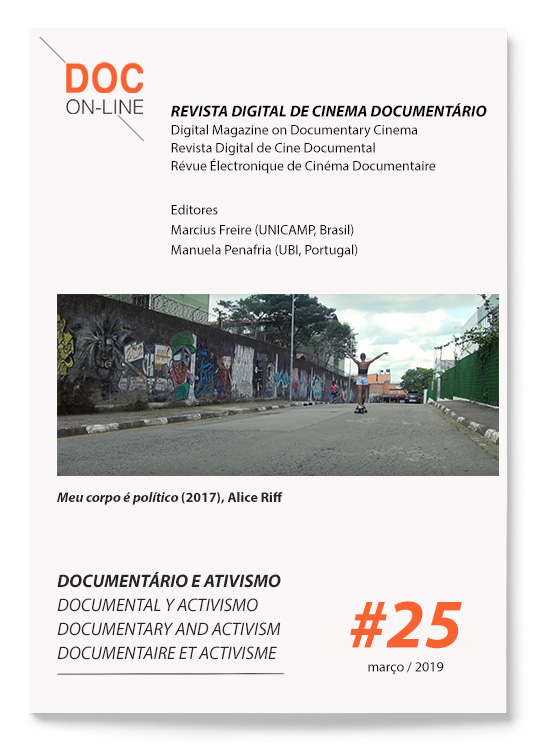Martin Scorsese Biopics: visual memory for the future
Mots-clés :
documentaire, subjectivité, mémoire visuelle, Selfie-biopic, Complice- biopic, Hommage biopicRésumé
Le but de ce texte est d’analyser trois biopics de Martin Scorsese, en se demandant s’ils peuvent fonctionner comme une source de mémoire visuelle ou un témoignage pour le futur, même si la subjectivité interfère dans les montages documentaires sur le cinéma et le théâtre, la littérature et la musique. En ce qui concerne le ton et la construction des biopics, nous les avons nommés «selfie-biopic», «complice-biopic» et «tribute-biopic». Le corpus principal de cette étude comprend des documentaires de trois types : une biographie complice sur le metteur en scène de théâtre et réalisateur Elia Kazan, Uma carta para Elia (2010) ; un «selfie-biopic», Public Speaking (2010), sur l’écrivain Fran Lebowitz ; et un «biopic hommage» sur la musique, George Harrison vivendo no mundo material (2011), évoquant le guitariste des Beatles. Le cadre de référence théorique comprend les concepts de la mémoire subjective de Beatriz Sarlo et l’étude des inter-expressions de Julia Kristeva. Les concepts de Bill Nichols et de Fernão Ramos sont pertinents pour la définition du documentaire moderne ainsi que pour l’histoire du documentaire de Deane Williams.
Références
Arneson, K. (2012). Representation through documentary: a post-modern assessment. Artifacts Journal. Missouri Univ. Avaliable in: https://artifactsjournal.missouri.edu/2012/03/representation-through-documentary-a-post-modern-assessment/
Bakhtin, M. (1984). Problems of Dostoevsky’s Poetics. Minneapolis: Univ of Minnesota Press.
Batty, D. & Johnston, C. (2014). Question and Answer with Mark Zuckerberg social network. Avaliable in: www.theguardian.com/technology/2014/nov/08/mark-zuckerberg-social-network-made-stuff-up-hurtful
Bingham, D. (2010). Whose lives are they anyway?. New Jersey: Rutgers UP.
Bradshaw, P. (2011). Review George Harrison. Avaliable in: http://theguardian.com/film/2011/sep/29/george-harrison-material-world
Brown, T. & Vidal, B. (s/d). Oxford Bibliographies. Avaliable in: www.oxfordbibliographies.com/view/document
Carlick, S. (2012). Martin Scorsese to unveil George Harrison Documentary. Exclaim. New Jersey: Rutgers UP.
Carroll, N. (1996). From real to reel: entangled in non-fiction film. In Theorizing the Movie Image. Cambridge: Cambridge UP.
Child, B. (2013). Nicole Kidman’s Grace Kelly biopic “inaccurate” say Monaco Royals. Avaliable in: http://www.theguardian.com/film/2013/jan/17/nicole-kidman-grace-kelly-biopic-innacurate
Deleuze, G. & Guattari, F. (1995). Mil Platôs: capitalismo e esquizofrenia. SP: Ed. 34.
Dirks, T. (s/d). Biopics Films. In Filmsite. Avaliable in: www.filmsite.org/biopics.html
Kristeva, J. (1980). Desire in Language: a semiotic approach to Literature and Art. Ed. Leon Roudiez, T. Gora et al. NY: Columbia UP.
Mangan, L. (2011). Cable Girl: Public Speaking. Avaliable in: www.theguardian.com/tv-and-radio/2011/feb/01/public-speaking-fran-lebowitz-scorsese
Matuszewski, B. (1898). Une nouvelle source de l’histoire du cinéma (Création d’un dépôt de cinématographie historique). Paris.
McCarthy, T. (2010). Review A letter to Elia. Avaliable in: www.indiewire.com/2010/09/review-a-letter-to-elia-22801
Miller, T. (1998). Technologies of Truth: Cultural Citizenship and the Popular Media. Ed. by Michael Renov, Faye Ginsburg, and Jane Gaines. Minneapolis: University of Minnesota Press.
Nichols, B. (2001). Introduction to Documentary. Bloomington & Indianopolis: Indiana UP.
Nichols, B. (1991). Representing Reality: Issues and Concepts in Documentary. Indianapolis: Indiana UP.
Nichols, B. (2001) How do documentaries differ from other types of film?. In Introduction to Documentary. Bloomington & Indianopolis: Indiana UP.
Patterson, T. (2010). The new Fran Lebowitz documentary. Free-range performance artist. Avaliable in: www.slate.com/articles/arts/culturebox/2010/11/freerange_performance_artist.html
Penafria, M. (1999). O filme documentário. História, identidade e tecnologia. Lisboa: Edições Cosmos.
Rabinowitz, P. (1994). They must be represented. London: Ed. Verso.
Rascaroli, L. (2012). The self-portrait film: Michelangelo’s last gaze. In The Cinema of me: the self and subjectivity in first person documentary. Ed. Alisa Lebow. NY: Columbia UP.
Ramos, F. P. (2008). Mas afinal... o que é mesmo documentário?. SP: SENAC.
Sarlo, B. (2007). Tempo passado: cultura da memória e guinada subjetiva. SP: Companhia das Letras; Belo Horizonte: UFMG.
Scott, L. (2012) Notes on Fran: the ethical camp and mute elegiac of FranLebowitz. In Research Gate GMBh. Berlin. Avaliable in: www.researchgate.net/publication/285701459_Notes_on_Fran_The_Ethical_Camp_and_Mute_Elegiac_of_Fran_Lebowitz
Stora-Sandor, J. (1984). L’humour juif dans la literature: de Job a Woody Allen. Paris: Presses Universitaires de France.
Filmography
A letter to Elia (2010), Martin Scorsese.
Amy (2015), de Asif Kapadia.
George Harrison: living in the material world (2011), de Martin Scorsese.
Grace of Monaco (2014), de Olivier Dahan.
Public Speaking (2010), de Martin Scorsese.
Steve Jobs (2015), de Danny Boyle.
The Social Network (2010), de David Fincher.
Téléchargements
Publiée
Numéro
Rubrique
Licence

DOC Online adopte une licence Creative Commons International CC BY 4.0 qui permet le partage du travail avec la reconnaissance de l'auteur et la publication initiale dans la révue DOC On-line, cela signifie que:
1) En soumettant un article, les auteurs conviennent que les droits de première publication de leur travail sont attribués à Doc On-line;
2) Après la publication en DOC On-line les auteurs peuvent republier leurs travaux, en ligne ou imprimée, sous la condition de clairement mentionner la première édition en DOC On-line.

